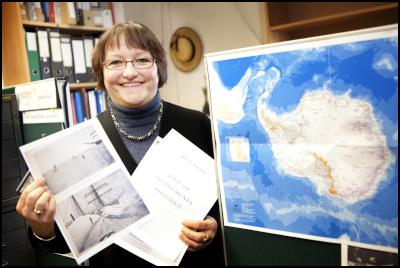Researcher Looking to Better Understand Antarctic weather
Researcher looking at past to better understand Antarctic weather
August 12, 2013
To better predict future Antarctic weather trends, a University of Canterbury (UC) researcher is seeking to understand the polar region’s past icy conditions.
The Antarctic is experiencing melting glaciers, break-up of ice shelves, warmer waters and shrinking polar peaks.
Dr Ursula Rack says the main concerns about Antarctic weather is the melting of ice and an increase in sea level.
``Questions on climate change and global warming are important for countries like New Zealand, for protecting their coastal areas and agricultural developments.
``Antarctica has a great influence on the weather in New Zealand. To better predict the future, we need to better understand the past.
``Continuous weather records from the Antarctic are available from the mid-1950s and changes can be retraced to that time.
``Working on models on climate developments is more challenging because of the spare data base 100 years ago or even further back. The first continuous weather records over a time period of one or two years in a row are existing from the beginning of the 20th century.
``I am investigating logbooks, meteorological journals and private diaries from the first expeditions in the Antarctic.
``Data from the Discovery Expedition led by Robert Falcon Scott and the Gauss Expedition led by Erich von Drygalski is helping to reconstruct historic weather information.
``The diaries help to put the weather records into a context on how it influenced the expedition members and provide additional valuable information about the harsh weather conditions to fill gaps where the instruments were not working.
``Some examples will help to understand what we are looking for. In the diaries are comments on slushy snow surfaces in November 1903 which made sledge travelling difficult. We would not expect comments like this in a diary written 110 years ago.
``Also visual documents from that time show that the ice was more open close to the historic Antarctic huts which we would not assume today.’’
Dr Rack is collaborating with other researchers to gain a better understanding of Antarctic climate.

ENDS


 Hugh Grant: Lessons From Australia - How Digital Tools Could Support NZ Nurses In Palliative Care
Hugh Grant: Lessons From Australia - How Digital Tools Could Support NZ Nurses In Palliative Care Canterbury Museum: Dinosaur Dolphins Survived In New Zealand Long After Extinction Elsewhere
Canterbury Museum: Dinosaur Dolphins Survived In New Zealand Long After Extinction Elsewhere Retail NZ: Retailers Still Under Pressure At End Of 2024
Retail NZ: Retailers Still Under Pressure At End Of 2024  University of Canterbury: Research Sheds Light On Fire Risk For Canterbury
University of Canterbury: Research Sheds Light On Fire Risk For Canterbury GE Free NZ: Potential $20 Billion Loss In Export Demand Threatens Rural Communities
GE Free NZ: Potential $20 Billion Loss In Export Demand Threatens Rural Communities Science Media Centre: Carbon-storing Construction Materials – Expert Reaction
Science Media Centre: Carbon-storing Construction Materials – Expert Reaction



